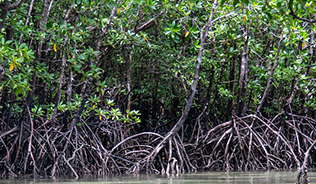Scientists and research institutes are challenging the idea that uncertainty in research is a reason for people to worry about the reliability of findings.
Researchers in climate science, disease modelling, epidemiology, weather forecasting and natural hazard prediction say that we should be relieved when scientists describe the uncertainties in their work. It doesn't necessarily mean that we cannot make decisions – we might well have ‘operational knowledge’ – but it does mean that there is greater confidence about what is known and unknown.
Launching a guide to Making Sense of Uncertainty at the World Conference of Science Journalists today, researchers working in some of the most significant, cutting edge fields say that if policy makers and the public are discouraged by the existence of uncertainty, we miss out on important discussions about the development of new drugs, taking action to mitigate the impact of natural hazards, how to respond to the changing climate and to pandemic threats.
Interrogated with the question ‘But are you certain?’, they say, they have ended up sounding defensive or as though their results are not meaningful. Instead we need to embrace uncertainty, especially when trying to understand more about complex systems, and ask about operational knowledge: ‘What do we need to know to make a decision? And do we know it?’
In Making Sense of Uncertainty they review the current discussion and discuss:
- The way scientists use uncertainty to express how confident they are about results
- That uncertainty can be abused to undermine evidence or to suggest anything could be true: from alternative cancer treatments to anthropogenic CO2 not changing the atmosphere.
- Why uncertainty is not a barrier to taking action – decision makers usually look for a higher level of certainty for an operational decision (such as introducing body scanners in airports) than for a decision based on broader ideology or politics (such as reducing crime rates).
Tracey Brown, Managing Director, Sense About Science: “Scientific research doesn't just produce information – about earthquake frequency or the causes of cancer - it estimates how much of the picture we have by trying to measure the uncertainty in that information. However, this does not mean that we are waiting for the day of certainty to arrive! It is especially important to recognise that in discussions where we have decisions to make, about whether to spend more on buildings that withstand earthquakes and whether to stockpile a vaccine. Instead, ‘do we have operational knowledge?’ is one of the most useful questions anyone can ask.”
David Stainforth, Senior Research Fellow, Grantham Research Institute, London School of Economics:“Uncertainty is simply part of our understanding. Sometimes the details matters, sometimes they don’t, but uncertainty is not a barrier to taking good decisions. Nor is it unfamiliar. We all take decisions under uncertainty every day.”
Angela Mclean, Professor of Mathematical Biology, University of Oxford: “If you can quantify the uncertainty around a statement then you have gone a long way towards understanding what is going on.”
Professor David Spiegelhalter, Winton Professor of the Public Understanding of Risk, University of Cambridge: “Policy-makers should be able to be open and honest about scientific uncertainty, while still being confident about the appropriate actions to be taken.”
Douglas Kell, Chief Executive of the Biotechnology and Biological Sciences Research Council: “As this new guide, Making Sense of Uncertainty makes clear, uncertainty is part of science and a part of life. Our world-leading scientists are capable of realising the limitations of uncertainty when providing evidence, informing decision making, and predicting outcomes. The aim of this guide is to bring about advanced discussions in society about what we know and how. We must consider uncertainty carefully but not be halted by it.”
Kathy Maskell, Communications Manager at the Walker Institute for Climate System Research, University of Reading: “Any prediction of future climate is uncertain and this can cause confusion for those making decisions about how to adapt to a changing climate – amongst the public, policymakers and business alike. This excellent guide to uncertainty from Sense about Science is highly pertinent and I would recommend it to anyone grappling with the issue of uncertainty in science.”


